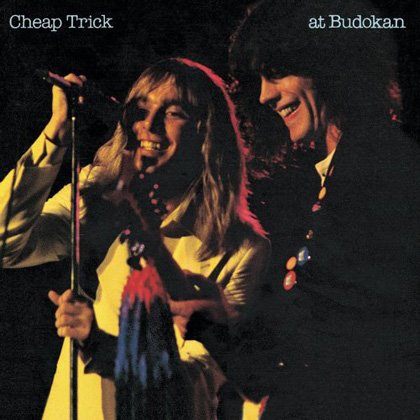
At Budokan (1978)

1.Hello There
2.Come On, Come On
3.Lookout
4.Big Eyes
5.Need Your Love
6.Ain't That a Shame
7.I Want You To Want Me
8.Surrender
9.Goodnight Now
10.Clock Strikes Ten
It is one of rock’s great ironies that Cheap Trick’s defining breakthrough came not from an American stage or radio hit, but from a live album recorded for a foreign market that—at first—wasn’t even intended for global release.
At Budokan, issued in 1978, is now canon, but it very nearly remained a regional curiosity. Designed initially as a Japanese-exclusive souvenir of the band's rabid fanbase there, the record’s electrifying energy and ecstatic reception would soon shatter those limited intentions.
The circumstances of its recording are almost mythic in retrospect. In Japan, Cheap Trick had already ascended to quasi-Beatlemania levels of worship.
Concertgoers at Tokyo’s Nippon Budokan shrine screamed through performances with unfiltered fervor, infusing the tapes with a kinetic energy that no studio environment could replicate. When imports of the Japanese
release began to outsell the band’s official U.S. catalog, Epic Records took notice. What followed was a global release that altered the band’s trajectory forever.
By contemporary standards, the setlist is an unusual representation of their sound. Notably absent is material from their hard-edged debut, a curious omission considering that album’s snarling brilliance.
Instead, the tracklist leans heavily on In Color, the band’s most polished and accessible record, and includes only a single song—Surrender—from Heaven Tonight, then their latest studio effort.
That Surrender would go on to become their signature song, despite being one of the only true new entries, speaks volumes to its enduring resonance.
The real revelation here, of course, is I Want You to Want Me. Originally a bouncy, borderline-novelty track on In Color, it explodes into a rock anthem onstage.
The crowd’s unrelenting adulation seems to transform it from pop confection into something triumphant and communal. Alongside it, Ain’t That a Shame and Surrender form a triple-shot that captures the band at its most potent: tuneful, theatrical, and loud.
Yet, as with many single-disc live records of its era, the brevity now feels limiting. Goodnight Now merely reprises Hello There, and the sprawling Need Your Love,
while ambitious, slows the momentum with its extended pacing. Still, even these lesser moments are saturated with atmosphere and attitude. The sheer thrill of performance often supersedes any technical missteps.
Years later, the band would revisit Budokan with expanded reissues: 1994’s Budokan II, followed by 1998’s At Budokan: The Complete Concert, which restored the full setlist and added context
to what had always felt like a tantalizing fragment. Those releases offer a more comprehensive view, but it’s the original LP—lean, imperfect, and thrilling—that remains the touchstone.
At Budokan may not have been the album Cheap Trick wanted to make, but it was the one that made them. It captures the moment when a cult act from Rockford, Illinois, turned global heroes—not by reinvention, but by simply letting the world hear what Japan already knew.
Go back to the main page
Go To Next Review